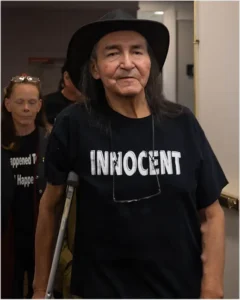
Mar 5, 1974
Jul 18, 2023
Manitoba
11 years
Allan Woodhouse
In 1973, 17-year-old Allan (A.J.) Woodhouse from Pinaymootang First Nation was wrongfully convicted of murder after being coerced into a false confession and denied a fair trial marked by systemic racism. He spent 17 years in prison maintaining his innocence before being fully exonerated in 2023—nearly 50 years later.
In the News
The journey
to justice
July 17
Ting Fong Chan was found beaten and stabbed to death in Winnipeg.
July 22
Allan was arrested for the murder of Ting Fong Chan.
September 18
Allan was transferred from juvenile court to adult court.
November 21 - 22
Allan was discharged in a preliminary inquiry.
January 28
Direct indictment filed against Allan.
March 5
Allan, alongside his co-accused Brian Anderson, Russell and Clarence Woodhouse, was tried and convicted of second-degree murder and sentenced to life imprisonment with no eligibility for parole for 10 years.
November 8
The Manitoba Court of Appeal dismissed Allan’s appeal.
May 23
Allan was released on parole.
November 26
Allan applied to Innocence Canada for support.
January 26
Innocence Canada submitted a 696.1 application on behalf of Allan’s co-accused, Brian Anderson.
February 10
Innocence Canada submitted a 696.1 application on behalf of Allan.
June 22
The Justice Minister and Attorney General of Canada (David Lametti) quashed Allan’s and Brian’s murder convictions and ordered new trials.
July 18
The Manitoba Crown Prosecutor called no evidence on the date of the new trial and acquitted both Allan and Brian.
The Case
In 1973, Allan (A.J.) Woodhouse, a 17-year-old youth from the Pinaymootang First Nation, was wrongly convicted of the murder of Ting Fong Chan. Only two months earlier, Allan had moved to Winnipeg from the Fairford Reserve. He was employed, living with his mother, had no criminal record and was nowhere near the crime scene at the time of the murder.
Despite this, Allan found himself a target of the Winnipeg Police Service and Crown prosecutor George Dangerfield, a Manitoba lawyer who has been heavily criticized for his role in several other wrongful convictions including those of Thomas Sophonow, James Driskell, Kyle Unger, and Frank Ostrowski.
The case was riddled with systemic issues, now recognized as common features in wrongful convictions, including coerced false confessions, systemic racism, professional misconduct, and tunnel vision. As a young Indigenous teenager in the 1970s, Allan was subjected to discriminatory policing practices and intense interrogation. With limited English language skills and under coercion, he was pressured into signing a false confession written in English. Allan has always maintained his innocence and has insisted he was not even with the other accused on the night of the murder.
His mother provided a strong alibi, but her testimony was silenced when the judge dismissed her from the trial. She spoke very little English and was not provided an interpreter, leaving the jury without the opportunity to hear crucial exculpatory evidence.
Allan was initially discharged following a preliminary inquiry in November 1973. However, just two months later, the crown ordered that he stand trial in an adult court despite being only 17 years-old and previously cleared. On March 5, 1974, alongside his co-accused, Brian Anderson, Clarence Woodhouse (Brian’s cousin) and Russell Woodhouse (Clarence’s brother), Allan was convicted of second-degree murder by an all-white all male jury. He was sentenced to life in prison with no eligibility for parole for 10 years.
The Fight for Justice
Allan served 17 years in prison, maintaining his innocence, even though admitting guilt was the only way to be considered for parole.
On November 8, 1974, the Manitoba Court of Appeal dismissed the Appeals of Allan and his co-accused. With no further legal avenues open to him, Allan continued to serve his life sentence while insisting he had been wrongly convicted. In 1990, Allan was released in parole but continued to live with the stigma of a murder conviction hanging over him.
The road to justice has been long and difficult. On November 26, 2018, Allan applied to Innocence Canada for help. Following the submission on Brian Anderson’s 696.1 application in 2019, Innocence Canada filed a 696.1 application on behalf of Allan to the Minister of Justice. The application set out the systemic racism, false confessions, lack of an interpreter and overlooked alibi evidence that led to the wrongful conviction.
The Exoneration
On June 22, 2023, then-Minister of Justice David Lametti exercised his ministerial powers and ordered a new trial for both Allan Woodhouse and Brian Anderson, acknowledging that their convictions were likely miscarriages of justice.
On July 18, 2023, at the Manitoba Court of King’s Bench, Crown prosecutors called no evidence and requested that both men be acquitted. Chief Justice Glenn D. Joyal formally acquitted them, stating:
“You deserve to hear two things very clearly. You are innocent. And you deserve the acquittals that I am happy to enter. You also deserve… an apology. An apology that I am too happy as Chief Justice of the Court of King’s Bench to render to you on behalf of an institution and a system that failed you.”
Life After Exoneration
After nearly 50 years of injustice, Allan Woodhouse’s name was finally cleared.
Jerome Kennedy, K.C., Board Director of Innocence Canada and Chair of the Innocence Canada Case Review Committee, who led the legal team for their exoneration, said:
“49 years has been an interminable wait for them but they never gave up. I never doubted their innocence.”
James Lockyer, Board Director of Innocence Canada, added:
“Their cases raise important systemic issues that need to be addressed in Manitoba and across Canada… to prevent the same wrongs being done to Indigenous peoples in the future.”

